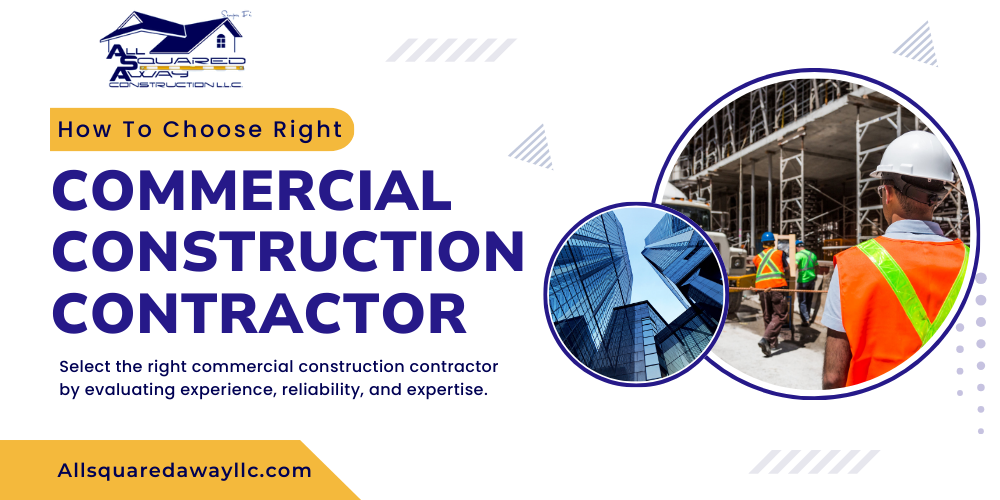A suitable contractor is very important in the success of a commercial construction project. Not only does a qualified contractor bring expertise to the table, but he also ensures the project is on schedule, within budget, and meets quality standards. This experience and resources can streamline the process and avoid costly delays or mistakes.
Whether it’s office buildings, retail space, or industrial complexes, the right contractor will take care of everything down to the finest detail, from permits and compliance to labor and materials supply, to ensure the vision is realized on time.
1. Assess Their Experience and Expertise
- Look at their portfolio: See from the contractor’s past projects if they have experience in commercial builds like office buildings, retail, or warehouses. Proven success with your project type ensures they are conversant with unique challenges and requirements.
- Specialized expertise counts: A contractor with experience in specialized construction in the industry a client is working in can provide more effective results. If contractors have built space for retail businesses, they can understand how maximum layout is crucial for customer traffic.
- Assess Project Scope Management: Experienced contractors can easily engage in projects of different degrees-from minor office renovation to gigantic works of construction. They value their resources appropriately and at no instance develop bottlenecks that might cause setbacks to the work.
- Quality assurance: Specialized contractors apply tested and proven methods to maintain high standards. Their in-depth knowledge allows them to solve problems and deliver superior craftsmanship proactively.
2. Verify Credentials and Compliance
The credentials of a contractor and the prerequisites should be verified to ensure the standards of his industry, the safety of, and the successful completion of a construction project. First, verify whether a contractor is licensed in your area. A licensed contractor follows the local codes and regulations, reducing possible legal issues. Check the relevant certifications from trade organizations or construction associations, which show the proof of commitment of a contractor to high industry standards.
After verifying experience, safety compliance comes second. To avoid accidents at the site, let the contractor follow all OSHA regulations and retain a good safety record. Lastly, verify a contractor’s insurance cover for general liability and workers’ compensation to protect you from any future financial loss because of accidents or property damage.
3. Check References and Reputation
- Request for testimonials: Ask the contractor for references to their previous clients for similar projects they have undertaken. Testimonials review the contractor’s reliability, quality of work, and time factor.
- Visit completed projects: Where possible, make arrangements to visit previous work sites. This will show you the quality of the work and how well the contractor handled problems on the job.
- Check online ratings and reviews: Look for a contractor’s profile on sites like Google, Yelp, or Angie’s List. The reviews of previous clients give good insight into the contractor’s reputation and consistency in services.
- Inquire about past project challenges: Request information regarding how the contractor has overcome problems in previous projects. It will expose their problem-solving skills and ability to handle unexpected events.
- Consult with industry colleagues: Reach out to other contractors, construction professionals, or suppliers who have dealt with the contractor. They give valuable feedback on his work and his reliability.
4. Evaluate Communication and Project Management Skills
Success in commercial construction lies solely in effective communication and good project management. Ensure the contractor can provide a project timeline with clearly defined milestones and associated completion dates. It means you should receive status updates regarding progress and be advised of delays. You’ll get a responsive point of contact to quickly address questions and issues and prevent misunderstandings that could easily disrupt projects.
Besides, good project management practices are fundamental in accomplishing the work on schedule and within the budget. The contractor should also have systems to track work progress, manage resources, and resolve issues quickly. It includes liaisons with subcontractors, suppliers, and the workforce to avoid delays and cost increases. A good contractor with proper project management will ensure that all project elements are moving in cohesion towards minimizing the chances of an unexpected complication, which keeps the construction flow going.
5. Compare Costs Without Compromising Quality
- Avoid the trap of lowest bid: A low bid might appear very attractive, but there is always a catch, such as low-quality material, hurried work, or surprise costs. Quality and project longevity will suffer if you choose based on price alone.
- Value versus Price: Find a contractor whose service price is reasonable considering the work, experience, and materials provided. A higher bid may better reveal superior craftsmanship, expertise, and even materials that will save you many agonizing dollars in repairs later.
- Request a detailed breakdown: The contractor should provide you with a very transparent, line-item estimate of the whole scope of the project. It should include labor, materials, contingencies, and permits. That keeps miscommunication at bay, and you get to see how this is costed for your benefit.
- Hidden costs: Beware of any extra fees cropping up once the project starts. Make sure your contract spells out any potential additional charges to avoid surprise at the bottom line later.
- Consider long-term savings: You can save in the long run by considering long-term savings. Finding a quality contractor will reduce maintenance problems, saving you money and making it more cost-effective, even if its initial costs are higher.
Conclusion
Selecting the right commercial construction contractor for reliable construction services is crucial for your project’s success. Consider experience, credentials, reputation, and cost-time management skills. Clear communication, expertise in your specific project, and strong project management skills are crucial for timely delivery. Considering these elements, you can avoid costly mistakes and ensure a smooth construction process.
Contact All Squared Away Construction, LLC today for professional advice and quality in commercial project management. Our construction company strives to bring your vision forward with exactness and excellence.





